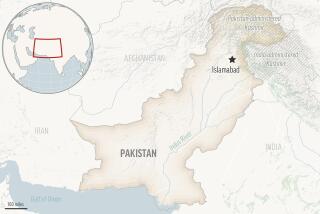Dozens die in Pakistan explosions
- Share via
PESHAWAR, PAKISTAN — About 30 suspected Islamic insurgents were reported killed Tuesday when explosions ripped through a compound near the border with Afghanistan that was described by Pakistani intelligence officials as a militant training camp.
The compound, which housed a madrasa, or religious school, was in North Waziristan, a semiautonomous tribal area along the Afghan frontier that is a known sanctuary for the Taliban and militants linked to Al Qaeda.
Tribal sources said they believed the blasts, which occurred about 10:30 a.m. in the district of Data Khel, about two miles from the border, were caused by missiles fired by a drone aircraft or Western forces in Afghanistan.
Pakistani officials denied that any U.S. or Pakistani military strike had occurred. A Pakistani army spokesman, Maj. Gen. Arshad Waheed, suggested that the explosions had been caused by bomb-making gone awry.
In Afghanistan, a spokesman for U.S.-led forces, Lt. Col. David Accetta, said he was not aware of any reports of American missiles being fired at targets inside Pakistan.
Previous strikes on compounds in the tribal borderlands where insurgents were thought to be sheltering have been widely attributed to the U.S. military. But such attacks are not acknowledged as a matter of policy, because they would be seen as an impingement on the sovereignty of Pakistan.
The Pakistani government, led by President Pervez Musharraf, is a crucial U.S. ally in the fight against insurgents in Afghanistan.
But military moves against militants on Pakistani soil are highly unpopular domestically, and Musharraf’s military-led government already is in a precarious state because of a growing pro-democracy movement.
Musharraf has been under pressure from the Bush administration to do more to rein in militants in the largely lawless tribal areas, where U.S. intelligence officials say insurgents have been able to regroup and rearm, using the region as a staging ground for attacks against Western forces.
Last fall, Musharraf’s government struck a controversial deal with insurgent-supported tribal leaders in North Waziristan: Pakistani troops halted active pursuit of militants, who in turn were supposed to refrain from attacks on allied troops in Afghanistan.
The accord was widely seen as a failure, leading to a jump in cross-border attacks. But neither side has formally rescinded it.
Al Qaeda leaders have been targeted by several strikes in the tribal borderlands, apparently by aerial drones, which appeared to have been beyond the capability of the Pakistan military.
Ayman Zawahiri, Al Qaeda’s No. 2, was the apparent target of a January 2006 strike in a border village in the Bajur region, but he was not hurt. A similar strike had occurred a month earlier in North Waziristan, killing a man believed to have been an Al Qaeda commander.
A Pakistani official, speaking on condition of anonymity, said the compound hit consisted of three houses and a tent and that about three dozen people were inside at the time.
Tribal sources, also speaking on condition of anonymity, said militants were seen bringing more than two dozen empty coffins to the area after the explosions.
--
Special correspondent Ali reported from Peshawar and Times staff writer King from Istanbul.
More to Read
Sign up for Essential California
The most important California stories and recommendations in your inbox every morning.
You may occasionally receive promotional content from the Los Angeles Times.












